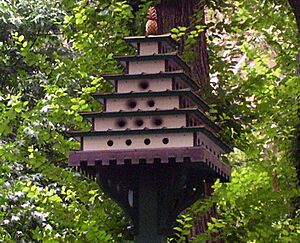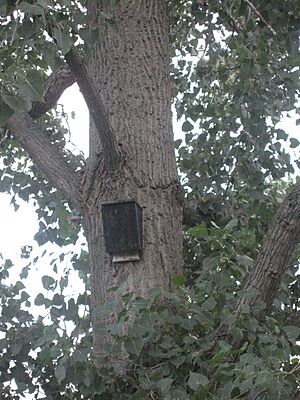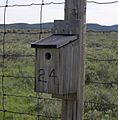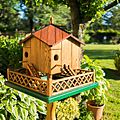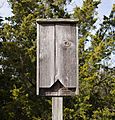Birdbox facts for kids
A birdbox is a special home made by people for birds. It's usually a wooden box, much like a hollow tree where birds naturally live. Birds often build their nests inside these boxes. People who love birds often put birdboxes on trees. They are also helpful for studying birds. For birds kept as pets, birdboxes are often used for breeding.
Most birdboxes are simple. They are made from six pieces of wood shaped like a cube. There's a hole in one side for birds to go in and out. Sometimes, there's a small stick outside the hole for birds to sit on. A sloped roof helps rain slide off. Some birdboxes can be very fancy and decorated. They can also be made from logs or even gourds. Birdboxes come in many sizes. Small ones are for tiny birds, but large ones are made for owls or parrots.
Even though birdboxes are for birds, other animals sometimes use them too. Bees might build their hives inside. Squirrels also find them to be cozy homes.
Contents
Building a Birdbox: Step-by-Step Guide
Choosing Materials for Your Birdbox
Birdhouses are usually made from wood. However, some birds, like the purple martin, might nest in metal boxes. There's also a material called woodcrete, which is a mix of wood and concrete.
It's best to use untreated wood for birdboxes. The roof should hang over the edges and be sloped so rain runs off easily. The floor should be slightly set in. Make sure there are small holes for drainage and air flow. It's good to have a way to open the box to clean it. Don't add perches outside the hole, as these can help predators. Boxes can have a simple entrance hole or be open at the front. Some birdboxes look like tiny human houses. You can even add small cameras inside to watch the birds!
Picking the Right Size for Bird Entrances
The size of the entrance hole is very important. It decides which types of birds will use the box. Many small birds choose boxes with a hole just big enough for them to fit through. This helps keep other birds from getting in and bothering their nests.
For example, in Europe:
- A 2.5 cm hole attracts marsh tits and willow tits.
- A 2.8 cm hole attracts pied flycatchers.
- A 3 cm hole attracts great tits and tree sparrows.
- A 3 cm hole also attracts house sparrows.
The overall size of the birdbox also matters. Very small boxes are good for wrens and treecreepers. Very large ones can attract ducks and owls. It's important to clean out old nest material and parasites each season. This helps birds reuse the boxes safely.
The material of the box can also make a difference. Sparrows seem to like woodcrete boxes more than wooden ones. Birds in woodcrete boxes laid eggs earlier. Their eggs also hatched faster, and more baby birds survived. This might be because woodcrete nests stay warmer.
Finding the Best Spot for a Birdbox
Where you place the birdbox is also very important. Some birds, like birds of prey, prefer their nest box to be at a certain height. Other birds, such as ducks, like their nests very low or even on the ground. Many birds prefer their box to face away from direct sun. They also like it to be sheltered from strong rain.
Building a Home for Bats
Bat boxes are different from bird boxes. They usually have a larger opening at the bottom. They are often called bat boxes, but they serve a similar purpose for raising young bats. Bat boxes can help some endangered bat species. However, bats that live in leaves or large caves won't use bat boxes.
Bat boxes are usually made of wood. There are designs for boxes with one or many rooms inside. You can find instructions for making open-bottom bat houses for both small and large groups of bats. The color of the box and where it's placed are important. Bat boxes that are too shady won't get warm enough to attract a group of mother bats and their babies.
In Australia, bat box projects have been running for over 12 years. For example, at Organ Pipes National Park, there are 42 bat boxes. At one point, 280 bats were living in them! The biggest challenge with any animal box is keeping it maintained. Problems include boxes falling down, wood getting old, and pests like ants, rats, possums, and spiders.
Other Animals That Use Nest Boxes
Nest boxes are made not just for birds, but also for butterflies and other mammals. These include animals that live in trees, like squirrels and opossums. Depending on the animal, these boxes are used for resting, having babies, or both. Butterflies might use them for hibernation during winter.
Sometimes, wasps might build their nests inside a box meant for other animals. If this happens, the wasps might keep the intended animals away.
Birdhouses Gallery
-
Typical nest boxes in the United Kingdom
Images for kids
-
Western bluebird leaving a nest box
-
Traditional nest box for Columba guinea in the wall of a homestead in Zerfenti (Ethiopia)
-
Great tit nesting in a nest box
-
Two wasp nests inside a nest box set for boreal owls
See also
 In Spanish: Caja nido para niños
In Spanish: Caja nido para niños
 | Charles R. Drew |
 | Benjamin Banneker |
 | Jane C. Wright |
 | Roger Arliner Young |


